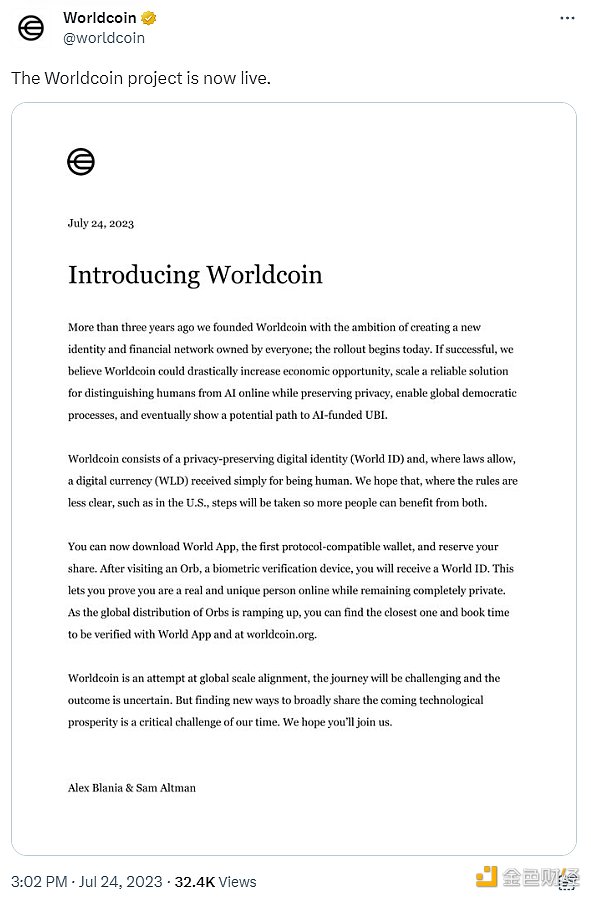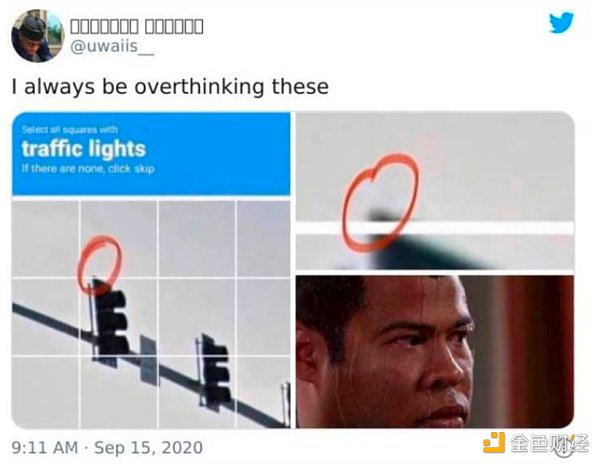WorldCoin officially launches its token. Will it become the next epic-level crypto project?
WorldCoin launches token. Will it become the next epic crypto project?On July 24, 2023, Sam Altman, CEO of OpenAI, announced on Twitter that its subsidiary Worldcoin officially launched the WLD token. Worldcoin includes the privacy-protected digital identity WorldID and the digital token WLD.
Worldcoin currently has over 2 million users participating in testing worldwide, and real users verified by Orbs will initially receive 25 WLD tokens.

In May, WorldCoin raised $115 million in Series C financing led by Blockchain Capital, with follow-on investments from a16z and others. Spencer Bogart, a partner at Blockchain Capital, explained why they invested in Worldcoin and what they believe the project will bring and its impact. It is well worth reading again.
- Review of the 13 award-winning projects at the ETHGlobal LianGuairis Hackathon
- Quick Look at the Cosmos Ecosystem Project TVL Data Changes
- LianGuai Daily | Twitter may change its logo to X-related; Terraform will release 9 projects but will not launch new tokens.
Will WorldCoin become the next epic crypto project?
Over the past decade of evaluating crypto opportunities, we have seen thousands of ambitious and inspiring projects, but Worldcoin is one of the most ambitious and reliable efforts to date, aiming to involve over 1 billion people in the crypto industry.
By leveraging a novel distribution strategy, Worldcoin has a unique opportunity to become the largest gateway to the crypto space, supported by the most widely adopted crypto wallet. Most importantly, it aims to establish a new language for the internet – Proof of Personhood.
Given the latest advancements in artificial intelligence, Proof of Personhood is particularly useful for distinguishing humans from robots on the internet. More details will be provided later.
It is worth noting that Worldcoin is already working: despite limited initial testing, limited awareness, and no marketing, Worldcoin has already attracted nearly 2 million people. This is just the beginning: Worldcoin co-founders Sam Altman (founder of OpenAI) and Alex Blania are focused on expanding to the global population.
01. First Impressions of Worldcoin
Historically, contributors to the Worldcoin protocol have done a poor job of spreading their entrepreneurial story.
Like most people, our initial reaction to Worldcoin was negative. The project seemed fundamentally Orwellian, appearing to be a harmful combination of hardware, biometric technology, and encryption – not for the faint of heart.
The negative news coverage around this aspect is actually quite apparent.
Even Edward Snowden echoed the criticism, saying, “Don’t classify eyeballs…”
But these criticisms are missing the point.
To evaluate Worldcoin from first principles, our team has spent hundreds of hours researching a wealth of documentation on Worldcoin, speaking with dozens of contributors to the project’s hardware and software, and discussing everything from underlying technology to the project’s GTM (Go-To-Market) strategy.
At first glance, Worldcoin appears to be a dystopian attempt to create a global currency with privacy-infringing (and capital-intensive) hardware, but it is actually something completely different: a fully privacy-preserving solution to address a growing problem. Furthermore, our evaluation concludes that Worldcoin has the contributor community (including its initial development team in Tools for Humanity, “TFH”), the technology (software and hardware), and the strategic support necessary to serve billions of users worldwide.
02. So, what is Worldcoin doing?
In order to register and verify users, Worldcoin scans everyone’s iris (the colored part around the pupil). This scan verifies that the person is indeed a real, living, and unique individual. The scan is performed using a custom hardware device called “orb”.

When it comes to biometric technology, there are valid reasons why people feel concerned and sensitive—especially when it involves encryption. Several science fiction movies and novels even have concepts of “harvesting eyeball information”. Naturally, dystopian views quickly come to mind.
However, in reality, what happens behind the scenes is that the orb takes a photo of the iris, and then the device generates a unique encoding of the iris randomness (“iris code”). By default, the original biometric feature is immediately destroyed, and the iris code is the only information that leaves the orb.
In the World App (the first wallet of the Worldcoin ecosystem) of TFH, verified users will receive a World ID, enabling them to privately prove to anyone they choose that they are indeed a unique individual. These on-chain identities are fully encrypted and secure. Even though the iris code is fully reversible, there is no way to know how anyone is using the World ID, nor is there a way to trace individual users.
In other words, World ID is a privacy-protecting identity protocol that does not collect or store anyone’s biometric information.
As part of the process, users can also create their own encrypted wallet in the World App. Considering the anti-witch attack resistance of World ID, World App is the world’s first self-hosted wallet with a known user base—all other wallets can only rely on speculation to obtain metrics such as DAU/MAU.
03. Well… but why?
At first glance, it is difficult to understand the value that the proof of personhood protocol can create. This is a fundamental reality of being a “category creator”—as a novel entity, it is difficult to quantify the utility and value of proof of personhood in the early stages.
However, at a higher level, it is easy to recognize that with the latest advancements in artificial intelligence, differentiating between humans and machines (“bots”) on the internet is becoming increasingly difficult and important.
More specifically, we can consider applications that have practicality in today’s context. One such opportunity in Web3 is airdrops: many token-based projects wish to reward each unique user with tokens (e.g., for onboarding, trading, or any other unique behavior that token-based projects may want to incentivize).
Unfortunately, identifying unique users is challenging. For example, it may be required for users to provide government-issued IDs as a sybil defense mechanism—but this i) excludes over half of the global population who lack appropriate IDs ii) introduces significant friction and iii) given the frequent occurrence of data security breaches in history, many users are skeptical about providing such information. As a result, the rewards intended for unique users are disproportionately allocated to those who exploit this mechanism with witch attacks and create thousands of wallets to collect a large number of free rewards.
Instead, airdrop issuers can use World ID as a proof of humanhood mechanism to supplement their airdrop criteria and reward unique users.
However, the application of proof of humanhood goes far beyond encryption. In order to distinguish between users and “bots,” basic Internet services introduce significant friction – we are so used to this friction that we hardly consider it anymore.
04, Friction, Sustainability, and Trust
One example of this slow friction is the increasing difficulty of captchas. There are intelligence tests like CAPTCHA to mitigate the risks and costs of witch attacks and DDoS attacks. However, captchas have become so challenging that most real users have a hard time providing the correct answers.

More importantly, this frustrates users and internet service providers alike. Interestingly, people worldwide spend a total of 200-500 years each day solving CAPTCHA puzzles (4.6 billion internet users encounter CAPTCHA every 10 days and take 15-35 seconds to solve it successfully). All this, just to prove our humanity!
But this is unrelated to captchas; they are just a common symptom, not the root problem. The problem is that we cannot quickly and reliably differentiate between machines and humans online – given the latest advances in artificial intelligence, this challenge is becoming increasingly widespread and harmful.
The potential impact of this helplessness is enormous: the vast majority of the internet relies on ad-based revenue to pay for infrastructure costs. However, in cases of higher robot-to-human ratios, the cost of serving (bot-intensive) traffic will exceed the revenue from serving ads to humans. Many websites and web-based services will become economically unsustainable. These web-based services may cease to exist. It is difficult to imagine other problems that have never been created before, as the current state of the problem (not to mention further growth) makes them economically unsustainable from the beginning.
This problem also goes beyond technical or economic nature and extends to the cultural sphere. We cannot distinguish between robots and humans, which greatly undermines trust in digital communities. Human users face increasingly severe challenges in filtering signals (humans) from noise (robots) in their digitally interacting communities.
In all cases, it is clear that as we continue to advance AI, intellectual tests like captchas are not sufficient to solve the problem. This is where identity verification protocols like World ID come into play.
05, World ID and Proof of Humanhood
By providing tools that easily distinguish between robots and humans, identity verification protocols like World ID will improve user experience, maintain the economic sustainability of existing web services, open up design space for new web services, and increase trust in digital communities. We believe that privacy-preserving identity verification protocols will become the fundamental primitives of the internet. Specifically, World ID allows individuals to verify their humanity online while remaining anonymous through zero-knowledge proofs. Verification is as simple as clicking a button to sign a transaction.
What happens behind the scenes? Behind the scenes, the World ID collection is maintained as a set of identity commitments in the form of a Merkle tree. Using zero-knowledge proofs, users can prove that they are included in the Merkle tree without revealing their specific identity. Essentially, this allows World ID users to confirm their identity as a verified person without revealing who they are, ensuring true privacy for user activities.
While the exact types of new web services that can be created are still to be observed, some easily achievable outcomes (as outlined by some developers building World ID) include:
-
Advanced spam filters: Intelligent tests such as browser DDoS protection and CAPTCHA-like tests without the need for implementation
-
Reputation system: By preventing the creation of multiple accounts, a reputation system becomes fundamentally more effective. For example, they can unlock undercollateralized loans in DeFi
-
Governance: One person, one vote (or similar) becomes feasible with privacy protection through World ID
-
Identity verification: Biometric-based identity verification can become part of the solution to digital identity theft
-
Fair distribution of scarce resources: With personality proof protocols like World ID, scarce or valuable resources can be directly allocated on the Internet without the risk of witch attacks.
These are just preliminary ideas about how World ID and proof of personhood can be used online. The biggest use cases and opportunities are likely ones we haven’t even imagined yet. We are excited to see others implementing and utilizing World ID in creative ways.

06, Team, Track Record, and Attractiveness
One of the core reasons we are excited to collaborate with the TFH team, which has supported the early development and growth of Worldcoin, is the quality of the team and their experience in solving difficult problems and producing genuine attractiveness.
Sam Altman and Alex Blania are the co-founders of TFH and completed the initial concept of Worldcoin. As co-founder and CEO of OpenAI, Sam brings a unique perspective from the forefront of AI, and as former president of Y Combinator, he also brings direct insights into startup scaling and success. Alex Blania complements Sam perfectly: Alex is a founder with a unique focus on detail and execution, and we strongly believe he will become a well-known name in the next decade. Together, they strike a delicate balance between vision and execution. Perhaps most importantly, Alex and Sam have recruited seasoned talent to help realize their ambitious vision for TFH. The team has already collectively built early experience in problem-solving. Specifically, the team has designed and produced custom hardware that was previously thought impossible or impractical. Despite being in early beta release with little marketing or visibility, the team has successfully attracted nearly 2 million users.
Ultimately, we believe TFH has a unique opportunity with the right technology, team, and timing to expand the privacy-protecting identity primitives of the Internet – in doing so, Worldcoin could become the gateway to cryptocurrencies, and the World App could become the most widely adopted crypto wallet.
We will continue to update Blocking; if you have any questions or suggestions, please contact us!
Was this article helpful?
93 out of 132 found this helpful
Related articles
- A Review of the 20 Award-winning Projects at ETHShanghai 2023 Hackathon
- Telegram Bots are rising unexpectedly, which projects are worth paying attention to?
- Review of the 20 award-winning projects from ETHShanghai 2023 Hackathon
- Bankless Inventory of Eight Important Project Progresses in EthCC 2023
- ConsenSys’s zkEVM Linea mainnet goes live, providing an overview of its ecosystem development status.
- New U.S. bipartisan bill DeFi projects to be regulated like banks, DeFi investors may be held accountable
- New bipartisan bill in the United States DeFi projects to be regulated like banks; DeFi investors can be held accountable.






